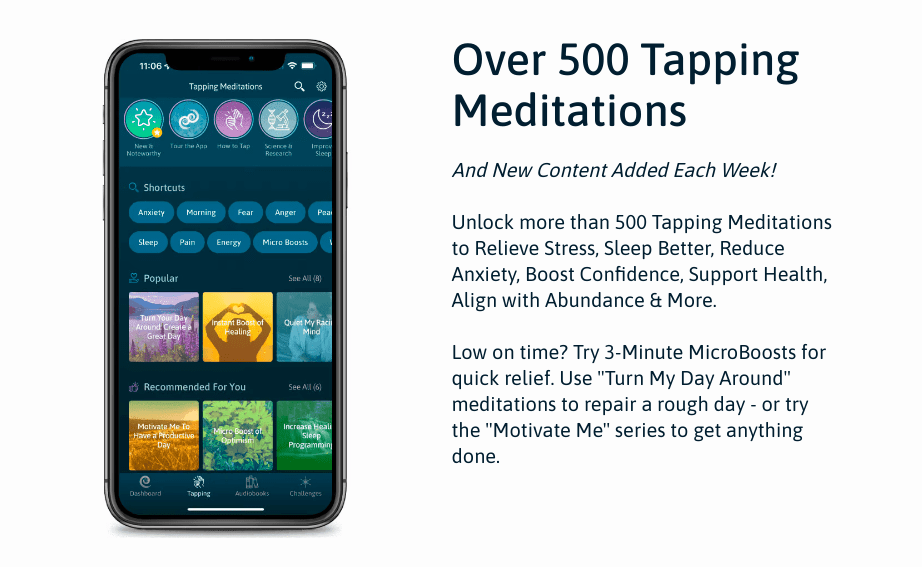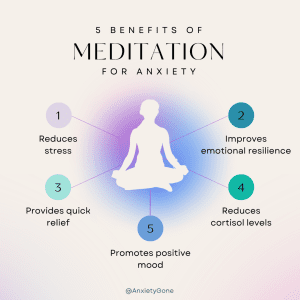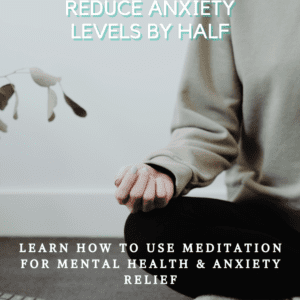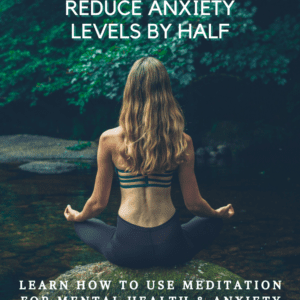What is Meditation?
Meditation is a practice that spans across many different cultures, traditions, and beliefs. Yet at its core, it embodies a universal essence of quiet introspection and mindfulness.
In the simplest terms, meditation involves training the mind to focus and redirect thoughts, often through techniques like mindfulness, breath awareness, or visualization. While it may conjure images of sitting cross-legged in serene solitude, meditation can take many forms, adaptable to various lifestyles and preferences.
Despite common misconception, meditation is not about emptying the mind of thoughts. Rather, it’s about observing them without judgment, creating a sense of presence and awareness in the present moment. As a result, meditation offers a calm sanctuary amidst the chaos of daily life; a space where one can explore the depths of their inner world and find moments of peace, clarity, and connection with oneself and the world around them.
The Science Supporting Anxiety Meditation
The Scientific Benefits of Anxiety Meditation for Calming Nerves
While there are many different treatments for anxiety, meditation has become increasingly popular as a natural, non-pharmaceutical approach to managing anxiety symptoms. The practice of meditation involves training the mind to focus and be present, which can help to reduce stress and promote relaxation. In this way, meditation has been shown to be an effective tool for managing anxiety and improving overall mental health and emotional well-being.
Regulates Stress Response
Meditation practices have been shown to reduce levels of cortisol, the stress hormone. This is done by mitigating physiological symptoms associated with anxiety such as elevated heart rate and blood pressure.
Anxiety Significantly Reduces After Each Session
Not only does anxiety meditation help reduce your cortisol levels over time, it also works almost instantly. In one study that looks at the effects of meditation after every 20-minutes session, the participants reported a significant reduction in anxiety. From a scientific standpoint, this is the result of the brain activating the anterior cingulate cortex, anterior insula and ventromedial prefrontal cortex, which are areas of the brain that control worrying.
Reduce Anxiety by 40% with Meditation
Another study that analyzed 15 healthy people with everyday anxiety both before and after the mindfulness meditation discovered that anxiety was reduced by up to 49%. The best part? This shows that as little as a few minutes of calming anxiety meditation each day can significantly improve your symptoms.
Greater Emotional Resilience
Consistent meditation cultivates greater emotional resilience by rewiring neural pathways involved in fear and threat perception. This leads to decreased reactivity to stress triggers over time.
Enhanced Self-Awareness
Meditation promotes self-awareness, allowing you to observe anxious thoughts and feelings without judgment. This allows you to respond with greater clarity and calmness.
Improved Cognitive Flexibility
Studies have highlighted meditation’s role in enhancing cognitive flexibility. This allows you to adaptively navigate anxious thoughts and situations.
Improve Overall Mental Health and Wellness
Another study conducted by Johns Hopkins University found, after 47 trials, that more can be done than just reducing anxiety with meditation. In fact, they found that meditation helped ease various psychological stresses, such as anxiety, depression and pain.
Reduction of Rumination
Meditation helps you break the cycle of rumination, which is the repetitive focus on negative thoughts and feelings. By cultivating present-moment awareness, meditation reduces the tendency to dwell on past events or worry about the future.
Enhanced Emotional Regulation
Meditation practices, particularly mindfulness, enhance emotional regulation by promoting acceptance and non-reactivity to thoughts and emotions. This helps individuals respond more adaptively to stressors and reduces anxiety. For additional support in calming the mind, some people turn to Budpop for hemp-derived products that naturally complement meditation by promoting relaxation and mental clarity.”
Neurobiological Changes
Studies using neuroimaging techniques have shown that meditation leads to structural and functional changes in the brain. These changes include increased gray matter density in areas involved in emotion regulation, such as the prefrontal cortex, and decreased activity in the amygdala, which is associated with fear and anxiety responses.
Mindfulness-Based Meditation Targets Anxiety Symptoms
A psychiatrist from the Center for Anxiety and Traumatic Stress Disorders, Dr. Elizabeth Hoge, found throughout her studies that participating in a mindfulness-based stress reduction program helped squash anxiety symptoms for people generalized anxiety disorder.
Plus, studies show that almost 100% of people experience less anxiety after mindfulness meditation program. One study even showed that almost everyone who participated and completed a 10-week mindfulness-based meditation reported experience a significant decrease in both physical and emotional symptoms of anxiety. They also reported having a greater sense of optimism, well-being and feelings of control. You can get started right now and receive access to hundreds of mindful-based meditations with The Mindfulness App.
These scientifically supported benefits underscore the transformative potential of anxiety meditation in soothing nerves and fostering a profound sense of tranquility amidst life’s challenges.
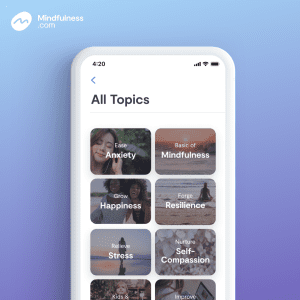
How to Meditate for Anxiety Relief
There’s one common denominator in all of these studies proving meditation can reduce anxiety, and that is the type of anxiety meditation you use. While there are various forms out there, all of which are incredibly beneficial for your physical, emotional and mental health, these studies specifically mentioned mindfulness meditation.
What is mindfulness meditation?
Mindfulness meditation is a type of meditation that involves paying attention to the present moment in a non-judgmental way. It involves becoming aware of one’s thoughts, emotions, and bodily sensations as they arise and learning to observe them without becoming attached or reactive to them. In this way, mindfulness meditation helps individuals to develop a greater sense of self-awareness and self-acceptance. It is often practiced by sitting in a quiet place, focusing on the breath, and bringing one’s attention back to the present moment whenever the mind starts to wander. With regular practice, mindfulness meditation can help individuals to reduce stress, improve concentration and focus, and promote overall mental and emotional well-being.
How to practice mindfulness meditation at home?
The awesome thing about using meditation is that you don’t have to go anywhere, nor do you have to spend any money. You just need to invest your mind and time. Now, getting into meditation does take time and practice. So, if you don’t slip into that deep realm of restorative relaxation right away, don’t worry. Just keep trying and keep doing it every day, even if it’s for 5 minutes. Although, the recommended time to meditate for anxiety relief is 20 minutes. Here are the steps to follow to start meditating:
- Find a quiet, clutter-free, distraction-free space
- Sit comfortably with your legs crossed or on a chair with your feet planted on the ground
- Straighten your posture without stiffening up
- Softly rest your hands in your lap
- Allow your gaze to fall gently downward (you can close your eyes if you wish)
- Take a moment to relax and begin to bring attention to your breath
- Continue to focus on every inhale and exhale you take, while also bring awareness to any sensations you feel in your body
- Keep breathing and paying attention to your breath and the physical sensations of each inhale and exhale
- If you become distracted, simply bring your attention back to your breath
- Continue doing so for a minimum of 5 minutes
- When you’re ready to finish, wiggle your toes and fingers, and bring your attention back to your environment



